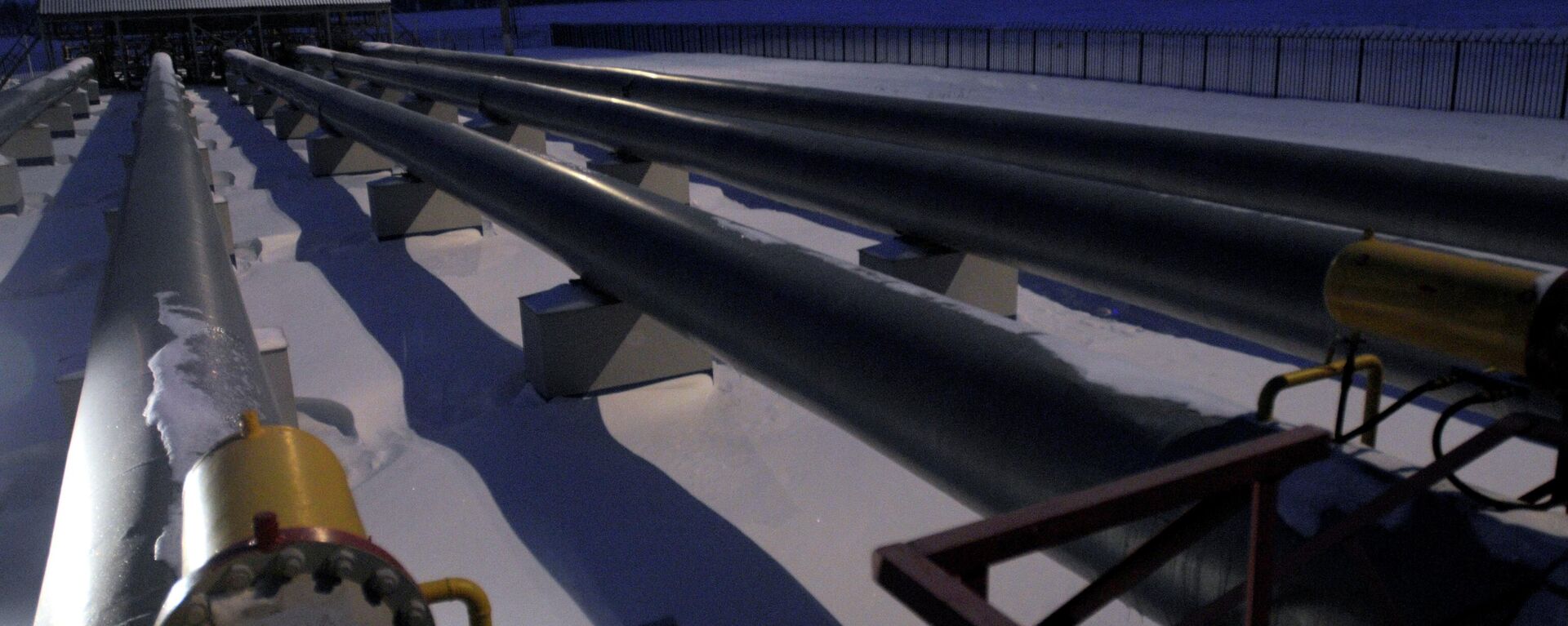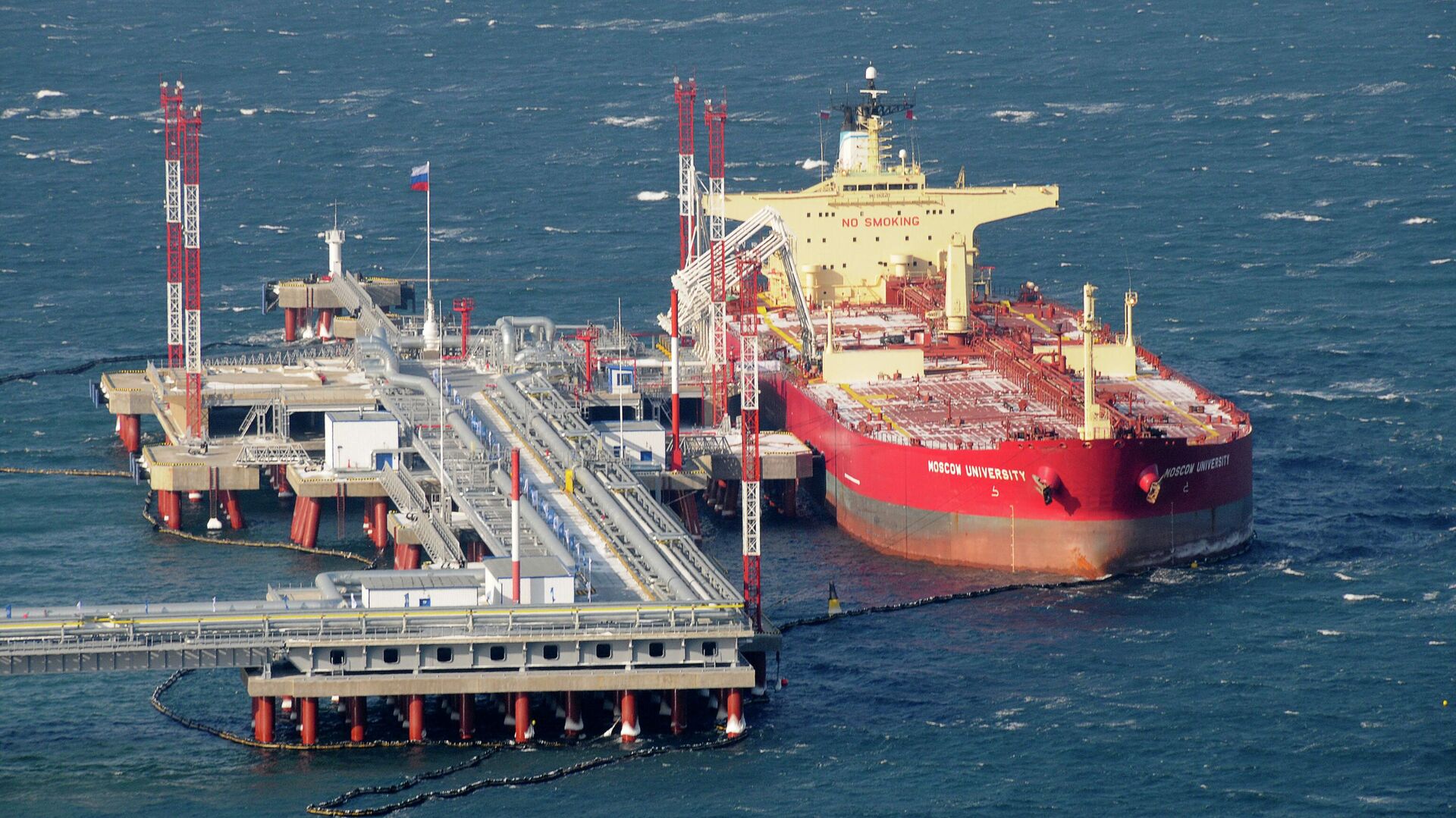https://sputnikglobe.com/20221123/eu-plans-to-postpone-price-cap-on-russian-oil--1104568405.html
EU 'Plans to Postpone Price Cap on Russian Oil'
EU 'Plans to Postpone Price Cap on Russian Oil'
Sputnik International
The EU/US plan is to limit Moscow's oil revenues in order to stem the tide of petrodollars into the Russian economy. Russia, for its part, has promised to stop... 23.11.2022, Sputnik International
2022-11-23T09:12+0000
2022-11-23T09:12+0000
2023-04-12T17:04+0000
economy
oil
russia
europe
josep borrell
china
us
european union (eu)
https://cdn1.img.sputnikglobe.com/img/07e6/07/1b/1097841995_0:276:3083:2010_1920x0_80_0_0_f18d6375a88874bc7cf2fefbb3da4764.jpg
Brussels plans to soften the conditions of a price cap on Russian oil, US media reported, citing an internal EU document.The EU proposed the introduction of a 45-days transition period before a price cap on Russian oil comes into full force. This “grace period” will be applied to oil loaded before December 5, which is the day the bloc is expected to ban Russian crude imports, and unloaded before January 19. The bloc also suggested a 90-day transition in the event of any potential changes to the level of the price cap.The cap would also ban companies from providing shipping and other services like insurance, brokering, and the financial assistance necessary to transport Russian oil anywhere, unless it is sold below the agreed-upon threshold. The new draft softens the conditions for vessels carrying Russian oil purchases above the price ceiling. In the previous edition, the document barred such ships from accessing European services for shipments. Now it is stated that such measures will be applied only if a vessel “intentionally” transports Russian crude purchased above the threshold.EU diplomats are scheduled to meet on Wednesday and discuss the cap and possible price levels. If they approve the proposal, the G7 and the European Union may already announce the cap on Wednesday evening.Previously, European functionaries promised to set the cap between $40 and $60 per barrel. However, leaks in the media indicate that price cap will be slightly above this range, but less than $70 per barrel.The idea of price cap is to set the price over the cost of extracting so that it still will be profitable for Russia to supply oil to EU, yet the price will be low enough to prevent any reasonable profit. Experts estimate that the cost for oil extraction in Russia fluctuates between $12 and $20 per barrel. Russian oil recently traded at nearly $70 per barrel on the global markets. Europe is not unanimous in its decision to impose an embargo on Russian oil. For instance, Hungarian Prime Minister Viktor Orban has repeatedly raised concerns that the sanctions against Russia hurt Europe more than they affect Moscow. According to Orban, sanctions against Russia will cost his country’s economy $10 billion per year. Chief of European diplomacy Josep Borrell has, meanwhile, indicated that the bloc needs to take a break before introducing fresh restrictions against Russia.US media have stressed the fact that Washington has pressured the European Union to force them to impose an embargo on Russian hydrocarbons. US representatives in the EU regularly express discontent to European authorities, accusing them of a lack of enthusiasm about imposing anti-Russian sanctions. US officials have recently intensified contacts with the EU to make sure that European leaders continue to support the anti-Russian course.Aside from trying to rally support in the EU, US Treasury Secretary Janet Yellen has claimed that the price cap on Russian oil would be beneficial to China and India and other countries that actively import Russian oil, since they will be able to buy it at a discount. Both India and China have refused to give in to the pressure, signaling that they were going to buy Russian oil at market prices. Meanwhile, Russian Deputy Prime Minister Alexander Novak stated that Russia would cease supplying oil to the countries that join the price cap initiative. Novak stressed that the price cap was an “act of unprecedented intervention in market principles,” adding that Russia would simply redirect the supply of oil to market-oriented countries or would reduce production.
https://sputnikglobe.com/20221025/russian-energy-minister-says-price-cap-on-gas-may-destabilize-global-energy-market-1102617130.html
https://sputnikglobe.com/20221115/top-five-factors-that-affect-oil-prices-1104224353.html
russia
china
Sputnik International
feedback@sputniknews.com
+74956456601
MIA „Rossiya Segodnya“
2022
News
en_EN
Sputnik International
feedback@sputniknews.com
+74956456601
MIA „Rossiya Segodnya“
Sputnik International
feedback@sputniknews.com
+74956456601
MIA „Rossiya Segodnya“
price cap, market cap, free market, oil, russia, oil market, hydrocarbons, us, eu
price cap, market cap, free market, oil, russia, oil market, hydrocarbons, us, eu
EU 'Plans to Postpone Price Cap on Russian Oil'
09:12 GMT 23.11.2022 (Updated: 17:04 GMT 12.04.2023) The EU/US plan is to limit Moscow's oil revenues in order to stem the tide of petrodollars into the Russian economy. Russia, for its part, has promised to stop supplying oil and petroleum products to countries that implement the price cap.
Brussels plans to soften the conditions of a
price cap on Russian oil, US media reported, citing an internal
EU document.
The EU proposed the introduction of a 45-days transition period before a price cap on
Russian oil comes into full force. This “grace period” will be applied to oil loaded before December 5, which is the day the bloc is expected to ban Russian crude imports, and unloaded before January 19. The bloc also suggested a 90-day transition in the event of any potential changes to the level of the price cap.
The cap would also ban companies from providing shipping and other services like insurance, brokering, and the financial assistance necessary to transport Russian
oil anywhere, unless it is sold below the agreed-upon threshold.
The new draft softens the conditions for vessels carrying Russian oil purchases above the price ceiling. In the previous edition, the document barred such ships from accessing European services for shipments. Now it is stated that such measures will be applied only if a vessel “intentionally” transports Russian crude purchased above the threshold.
EU diplomats are scheduled to meet on Wednesday and discuss the cap and possible price levels. If they approve the proposal, the G7 and the European Union may already announce the cap on Wednesday evening.

25 October 2022, 11:55 GMT
Previously, European functionaries promised to set the cap between $40 and $60 per barrel. However, leaks in the media indicate that price cap will be slightly above this range, but less than $70 per barrel.
The idea of price cap is to set the price over the cost of extracting so that it still will be profitable for Russia to supply oil to EU, yet the price will be low enough to prevent any reasonable profit. Experts estimate that the cost for oil extraction in Russia fluctuates between $12 and $20 per barrel. Russian oil recently traded at nearly $70 per barrel on the global markets.
Europe is not unanimous in its decision to impose an embargo on Russian oil. For instance, Hungarian Prime Minister Viktor Orban has repeatedly raised concerns that the sanctions against Russia hurt Europe more than they affect Moscow. According to Orban, sanctions against Russia will cost his country’s economy $10 billion per year. Chief of European diplomacy
Josep Borrell has, meanwhile, indicated that the bloc needs to take a break before introducing fresh restrictions against Russia.
US media have stressed the fact that Washington has pressured the European Union to force them to impose an embargo on Russian hydrocarbons. US representatives in the EU regularly express discontent to European authorities, accusing them of a lack of enthusiasm about imposing anti-Russian sanctions. US officials have recently intensified contacts with the EU to make sure that European leaders continue to support the anti-Russian course.

15 November 2022, 18:06 GMT
Aside from trying to rally support in the EU, US Treasury Secretary Janet Yellen has claimed that the price cap on Russian oil
would be beneficial to China and India and other countries that actively import Russian oil, since they will be able to buy it at a discount. Both India and
China have refused to give in to the pressure,
signaling that they were going to buy Russian oil at market prices.
Meanwhile, Russian Deputy Prime Minister Alexander Novak stated that Russia would cease supplying oil to the countries that join the price cap initiative. Novak stressed that the price cap was an “act of unprecedented intervention in market principles,” adding that Russia would simply redirect the supply of oil to market-oriented countries or would reduce production.
"Russia confirms its status as a reliable energy supplier to the world market and the market status of our relations with partners. In this regard, we do not plan to supply oil and petroleum products to countries that will apply the principle of a price cap with the subsequent reorientation of supplies to market-oriented partners or with a production reduction," Novak said.




